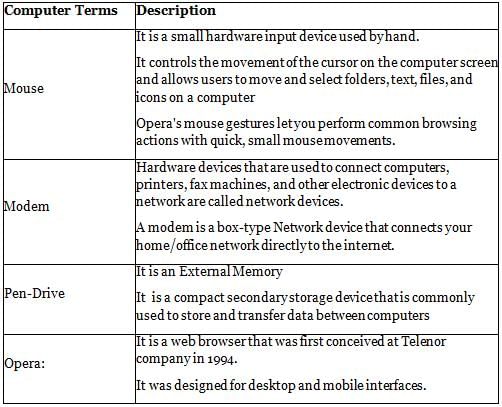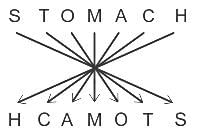APSET Paper 1 Mock Test - 1 - AP TET MCQ
30 Questions MCQ Test APSET Mock Test Series 2026 - APSET Paper 1 Mock Test - 1
Research has shown that the most frequent symptom of nervous instability among teachers is
Which of the following school of philosophy accepts 'Sabda' as valid means of knowledge?
What is the basis on which assumptions are formulated?
Which of the following problems is related to classroom management?
If a researcher conducts a research on finding out which administrative style contributes more to institutional effectiveness? This will be an example of__________.
Directions: Read the following passage carefully and answer the given question.
James adison said, "People who mean to be their own governors must arm themselves with power that knowledge gives." In India, the Official Secrets Act, 1923 was a convenient smokescreen to deny members of the public access to information. Public functioning has traditionally been shrouded in secrecy. But in a democracy in which people govern themselves, it is necessary to have more openness. In the maturing of our democracy, right to information is a major step forward; it enables citizens to participate fully in the decision-making process that affects their lives so profoundly. It is in this context that the address of the Prime Minister in the Lok Sabha is significant. He said, "I would only like to see that everyone, particularly our civil servants, should see the Bill in a positive spirit; not as a draconian law for paralysing Government, but as an instrument for improving Government-Citizen interface resulting in a friendly, caring and effective Government functioning for the good of our People." He further said, "This is an innovative Bill, where there will be scope to review its functioning as we gain experience. Therefore, this is a piece of legislation, whose working will be kept under constant reviews."
The Commission, in its Report, has dealt with the application of the Right to Information in Executive, Legislature and Judiciary. The Judiciary could be a pioneer in implementing the Act in letter and spirit because much of the work that the Judiciary does is open to public scrutiny. Government of India has sanctioned an e-governance project in the Judiciary for about Rs. 700 crore which would bring about systematic classification, standardisation and categorisation of records. This would help the Judiciary to fulfil its mandate under the Act. Similar capacity building would be required in all other public authorities. The transformation from non-transparency to transparency and public accountability is the responsibility of all three organs of the State.
Q. Right to Information is a major step forward to
The UGC has mandated a six‐month module syllabus for UG courses for all branches of higher education with the objective:
A. to implement CBCS in the true sense
B. to enhance knowledge, skills and attitude towards the environment
C. to provide first‐hand knowledge on various local environmental aspects
D. to implement the order of Hon'ble Supreme Court of India
E. to protect the environment
Choose the correct answer from the options given below:
The essential quality/qualities of a researcher is/are
Match List I with List II

Choose the correct answer from the options given below:
Direction: Read the passage carefully and choose the best answer to each question out of the four alternatives.
It is not good manners to stop a person on the street or in a shop, or in the performance of any duty and to talk to him for ten, fifteen, or twenty minutes just to pass the time of day. We can tell that a person is in a hurry to get somewhere, or he is doing something, and we know enough not to interrupt him for any length of time. Yet some of us think nothing of calling someone on the telephone, interrupting him without a thought about what he may be doing, and chattering away, forgetting about time or anything else. Perhaps we don’t consider our telephone conversation an interruption because we don’t see what we have interrupted. Naturally, we must observe the common courtesies over the telephone. But we must remember that one of the courtesies of telephoning is to be brief.
Never ask anybody to guess who you are? The person you are telephoning may not be in a guessing mood. If you know him, you may want to ask after the state of his health and that of his family, but as soon as you possibly can, go get on with your business. He certainly wants to know why you are telephoning him. When you are finished with your business, you might take moment to observe the natural courtesies of conversation, expressing your thanks before ending your call.
From the way the telephone is used in your home, you would hardly suspect that this is an instrument on which very important business transactions are conducted. There are times when even you are called upon to be business-like, brief, and effective on the telephone.
Q. How can we make the best use of a telephone?
Directions: Read the following passage carefully and answer the question.
The popular view of towns and cities in developing countries and of urbanisation process is that despite the benefits and comforts it brings, the emergence of such cities connotes environmental degradation, generation of slums and squatters, urban poverty, unemployment, crimes, lawlessness, traffic chaos etc. But what is the reality? Given the unprecedented increase in urban population over the last 50 years from 300 million in 1950 to 2 billion in 2000 in developing countries, the wonder really is how well the world has coped, and not how badly.
In general, the urban quality of life has improved in terms of availability of water and sanitation, power, health and education, communication and transport. By way of illustration, a large number of urban residents have been provided with improved water in urban areas in Asia’s largest countries such as China, India, Indonesia and Philippines. Despite that, the access to improved water in terms of percentage of total urban population seems to have declined during the last decade of 20th century, though in absolute numbers, millions of additional urbanites have been provided improved services. These countries have made significant progress in the provision of sanitation services too, together, providing for an additional population of more than 293 million citizens within a decade (1990-2000). These improvements must be viewed against the backdrop of rapidly increasing urban population, fiscal crunch and strained human resources and efficient and quality-oriented public management.
Q. Which of the following statements cannot be inferred from the given passage?
Which one of the following is considered a sign of motivated teaching?
Directions: Study the following information and answer the question that follows.
The percentage of employees in various departments in company A is as shown below.
There are 1800 employees in total.
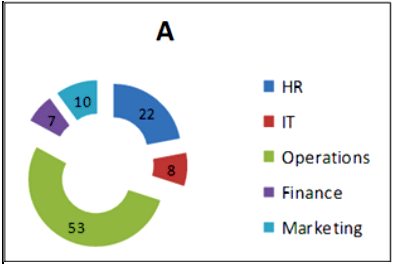
Q. If 30 more people join the Operations department, then what will be the percentage of employees in the Operations department?
Regulation of environmental equilibrium is successfully achieved by:
Which of the following is/are classified in the category of the developmental research?
Directions: Read the following passage carefully and answer the question.
It should be remembered that the nationalist movement in India, like all nationalist movements, was essentially a bourgeois movement. It represented the natural historical stage of development, and to consider it or to criticise it as a working-class movement is wrong. Gandhi represented that movement and the Indian masses in relation to that movement to a supreme degree, and he became the voice of Indian people to that extent. The main contribution of Gandhi to India and the Indian masses has been through the powerful movements which he launched through the National Congress. Through nation-wide action he sought to mould the millions, and largely succeeded in doing so, and changing them from a demoralised, timid and hopeless mass, bullied and crushed by every dominant interest, and incapable of resistance, into a people with self-respect and self-reliance, resisting tyranny, and capable of united action and sacrifice for a larger cause.
Gandhi made people think of political and economic issues and every village and every bazaar hummed with argument and debate on the new ideas and hopes that filled the people. That was an amazing psychological change. The time was ripe for it, of course, and circumstances and world conditions worked for this change. But a great leader is necessary to take advantage of circumstances and conditions. Gandhi was that leader, and he released many of the bonds that imprisoned and disabled our minds, and none of us who experienced it can ever forget that great feeling of release and exhilaration that came over the Indian people.
Gandhi has played a revolutionary role in India of the greatest importance because he knew how to make the most of the objective conditions and could reach the heart of the masses, while groups with a more advanced ideology functioned largely in the air because they did not fit in with those conditions and could therefore not evoke any substantial response from the masses.
It is perfectly true that Gandhi, functioning in the nationalist plane, does not think in terms of the conflict of classes, and tries to compose their differences. But the action he has indulged and taught the people has inevitably raised mass consciousness tremendously and made social issues vital. Gandhi and the Congress must be judged by the policies they pursue and the action they indulge in. But behind this, personality counts and colours those policies and activities. In the case of very exceptional person like Gandhi, the question of personality becomes especially important in order to understand and appraise him. To us he has represented the spirit and honour of India, the yearning of her sorrowing millions to be rid of their innumerable burdens, and an insult to him by the British Government or others has been an insult to India and her people.
Q. The change that the Gandhian movement brought among the Indian masses was
A trader marks his goods 40% above the cost price and gives the discount of 20% on it. What is the profit percentage?
Direction: Study the following table and answer the question asked.
The data of total number of people in different cities of a country and percentage of females is given in the table.

Q. What is the total number of people live in all the cities together?
A motorboat can travel at 10 km/hr in still water. It travelled 91 km downstream and then returned, taking 20 hours altogether. What is the speed of flow of water in the river?
Directions: Read the following passage carefully and answer the question.
The phrase “What is it like?“ stands for a fundamental thought process. How does one go about observing and reporting on things and events that occupy segments of earth space? Of all the infinite variety of phenomena on the face of the earth, how does one decide what phenomena to observe? There is no such thing as a complete description of the earth or any part of it, for every microscopic point on the earth’s surface differs from every other such point. Experience shows that the things observed are already familiar, because they are like phenomena that occur at home or because they resemble the abstract images and models developed in the human mind.
How are abstract images formed? Humans alone among the animals possess language; their words symbolise not only specific things but also mental images of classes of things. People can remember what they have seen or experienced because they attach a word symbol to them.
During the long record of our efforts to gain more and more knowledge about the face of the earth as the human habitat, there has been a continuing interplay between things and events. The direct observation through the senses is described as a percept; the mental image is described as a concept. Percepts are what some people describe as reality, in contrast to mental images, which are theoretical, implying that they are not real.
The relation of Percept to Concept is not as simple as the definition implies. It is now quite clear that people of different cultures or even individuals in the same culture develop different mental images of reality and what they perceive is a reflection of these preconceptions. The direct observation of things and events on the face of the earth is so clearly a function of the mental images of the mind of the observer that the whole idea of reality must be reconsidered.
Concepts determine what the observer perceives, yet concepts are derived from the generalisations of previous percepts. What happens is that the educated observer is taught to accept a set of concepts and then he/she sharpens or changes these concepts during a professional career. In any one field of scholarship, professional opinion at one time determines what concepts and procedures are acceptable, and these form a kind of model of scholarly behaviour.
Q. According to the passage, human beings have mostly in mind
Match List I with List II.
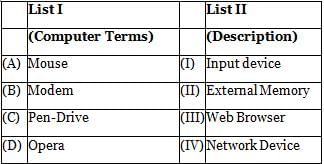
Choose the correct answer from the options given below:
Which of the following is not a type of LAN technology?
Directions: Study the given information and answer the following question.
The line graph shows the incentive points earned by four salespersons in different months of 2017.
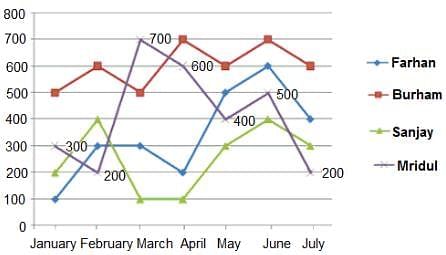
Q. Which salesperson(s) earned the second-highest points during the given period?
In a certain code language, 'STOMACH' is written as 'HCAMOTS'. How will 'PHONES' be written in that language?
Directions: Read the following passage carefully and answer the following question.
All historians are interpreters of text if they be private letters, Government records or parish birthlists or whatever. For most kinds of historians, these are only the necessary means to understanding something other than the texts themselves, such as a political action or a historical trend, whereas for the intellectual historian, a full understanding of his chosen texts is itself the aim of his enquiries. Of course, the intellectual history is particularly prone to draw on the focus of other disciplines that are habitually interpreting texts for purposes of their own, probing the reasoning that ostensibly connects premises and conclusions. Furthermore, the boundaries with adjacent subdisciplines are shifting and indistinct, the history of art and science both claim a certain autonomy, partly just because they require specialised technical skills. Both can also be seen as part of a wider intellectual history, as is evident when one considers. For example, the common stock of knowledge about cosmological beliefs or moral ideals of a period.
Like all historians, the intellectual historian is a consumer rather than a producer of ‘methods’. His distinctiveness lies in which aspect of the past he is trying to illuminate, not in having exclusive possession of either a corpus of evidence or a body of techniques. That being said, it does seem that the label ‘intellectual history’ attracts a disproportionate share of misunderstanding.
It is alleged that intellectual history is the history of something that never really mattered. The long dominance of the historical profession by political historians bred a kind of philistinism, an unspoken belief that power and its exercise was ‘what mattered’. The prejudice was reinforced by the assertion that political action was never really the outcome of principles or ideas that were ‘more flapdoodle’. The legacy of this precept is still discernible in the tendency to require ideas to have ‘licensed’ the political class before they can be deemed worthy of intellectual attention, as if there were some reasons why the history of art or science, of philosophy or literature, were somehow of interest and significance than the history of Parties or Parliaments. Perhaps in recent years, the mirror-image of this philistinism has been more common in the claim that ideas of any one systematic expression or sophistication do not matter, as if they were only held by a minority.
Q. Intellectual historians do not claim exclusive possession of
Which one of the following is a non-probability sampling?
Match List I with List II gives their characteristic features.
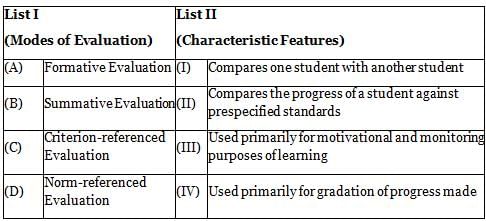
Choose the correct answer from the options given below :
Environmental education should be taught in schools because
|
60 tests
|



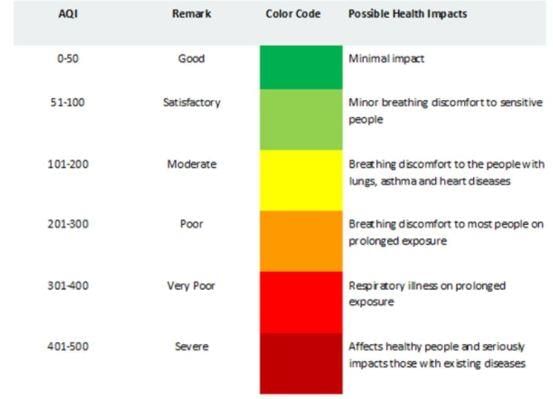
 = 954
= 954



